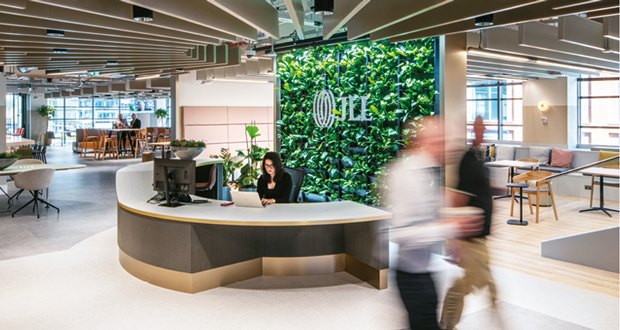CORPORATE SOLUTIONS
According to JLL’s Workforce Preferences Barometer(ii), working somewhere other than the office has become the norm for over half of corporate employees, while the Future of Work survey found that 53 per cent of organisations were planning to make remote working permanently available to all employees by 2025. Given these stats, Asprey Price stresses the need for workplace strategists to guard against the emergence of a two-tier workforce, where those at the headquarters are based in an ideal location which is amenities and services-rich, compared to those based in smaller offices that don’t offer the same level of amenities.
She explains: “Some secondary office markets where the quality of the space may not be as great are struggling to attract the talent in. Fewer employees will want to go to an office that feels half empty and doesn’t have the amenities.
“This ‘flight to quality’ is very real and by rightsizing portfolios, businesses have the money to spend on spaces that are really critical. A lot of the questions our advisory teams are asking is: ‘what is the shape of the portfolio that supports your hybrid work model, that allows you to have those amenity rich assets that really attract people?’”
She adds that with the cost of living crisis, while we might be moving into a more cost-conscious business environment, at the same time, real estate decision makers are realising that there is a correlation between space and talent attraction and that the purpose of a company is reflected through its real estate.
“COVID brought real estate to the forefront, and it is now core to the value proposition of a business. The workplace isn’t just a place for people to show up but has a fundamental purpose, not only for employees to perform roles more efficiently but its social aspect is a reflection of a company’s brand.”
There is also an opportunity for organisations to create a welcoming and diverse workplace, where managers take a more collaborative, empathetic approach to leading their teams. This is an area which Asprey Price has been championing throughout her career.
“I am proud of what all of us have done in this sector to raise the profile of diversity over the past few years. But there is still more to be done. We still have challenges of keeping female talent, especially those with young children.
“We still see this in peer to peer dynamic where young women who’ve taken time out with maternity leave may not be at the same professional level as their male colleagues. But I’m delighted to see paternity leave take up is growing. It truly shows how we’re changing family leave by making it more acceptable to all. In terms of diversity however, we must keep checking our approach to ensure equality across the board.”
To help meet these challenges, JLL has developed a diversity, equity, and inclusion (DEI) standard which, coupled with its Workforce Advisory EMEA offering, aims to support clients across the region in helping build diverse and inclusive workplaces.
Says Asprey Price: “Changes are not always costly, you might need to retrofit space, but it also can simply be changing policy, reconfiguring space or the facilities to support that. At JLL, the topic of sustainability is very diverse, moving from a macro level focusing on the world economy all the way through to what can you do within a meeting room for an individual.”
The wider sustainability agenda of course remains critical, and as Asprey Price points out, with 60 per cent of emissions in cities coming from real estate, is something that needs to be addressed as a sector – with advisors, investors and occupiers playing a key role in achieving a net zero carbon future.
“Retrofitting is a key challenge,” she says. “Knocking down buildings and creating new ones is not the way to achieve our targets and with an aggressive schedule to meet carbon commitments, we’ve got a lot of work to do to achieve this in a slightly capital constrained market.
“This is something into which JLL is putting a lot of time and effort – as our circular economy Water Street office in Canary Wharf(iii) demonstrates. There, even the furniture is upcycled but looks and feels incredible and that’s important to demonstrate that when we say circular economy we don’t mean a fall in quality.
“This also incorporates the ESG elements, the environmental, equality and adopting D&I around neurodiversity so, for example in Water Street, we utilise different tones of colours, as research suggests the traditional JLL red is not so suited to some neurodiverse colleagues. We’ve also got all gender toilets to support that culture of inclusivity.”
Asprey Price employs her former international rugby credentials to make her own societal contribution as a trustee with London Youth(iv) which offers kids join a group of like-minded people in playing sport.
“I’ve also had the opportunity to meet young people and talk to them about working in the property industry. When so many people don’t know what we do, education and attraction of talent to our sector is important, so engagement at a young age is critical.”
CHALLENGES IN 2023
Looking at the challenges ahead this year, she advises that managing constrained budgets, meeting sustainability goals and solving the hybrid working conundrum will require a lot of strategic thinking.
“When it comes to hybrid working, the biggest opportunity will be how to make it work and manage it effectively. How workplace managers manage to overcome this will be key and that includes managing inefficiencies, particularly when assets aren’t being used.
“Technology will continue to play a key role in the new world of work. We’re going back to basics with the use of sensors that monitor which space is being used and offering colleague apps to help connect people. But all these solutions require workplace managers who can help people work efficiently and offer them the tools required to do that.
“In 2023 the purpose of the office and the fact it is a key part of doing business remains true, but how we do that and ensure it remains relevant for us all is going to be the biggest challenge.”
For her she concludes: “I feel very privileged to work in JLL where you get such a wide perspective and in my new role seeing some of that cultural diversity from across the regions is fascinating. If you’re a curious person this is an amazing sector to be in, for instance, ‘why is our Paris office so busy compared to many others?’ It’s all about the why?”





